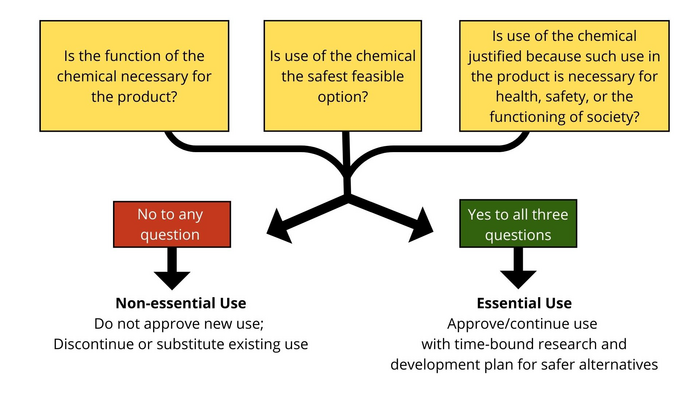A new approach can help governments and businesses eliminate harmful chemicals from daily use and exposure, according to a paper published today in Environmental Science & Technology.

Credit: Balan et al. (2023) Optimizing Chemicals Management in the United States and Canada through the Essential-Use Approach. Environ. Sci. Technol. https://doi.org/10.1021/acs.est.2c05932
A new approach can help governments and businesses eliminate harmful chemicals from daily use and exposure, according to a paper published today in Environmental Science & Technology.
It’s a simple concept, but a drastic departure from the status quo of chemicals management in the U.S. and Canada. The authors lay out recommendations for implementing this approach to benefit public health, the environment, and the economy. The authors advocate for using “essential use approach” to speed up and more efficiently take harmful chemicals out of the marketplace.
“In the U.S. and Canada, most chemicals have not been evaluated prior to use,” said Carol Kwiatkowski, co-author and scientist at the Green Science Policy Institute. “Once a chemical is suspected of causing harm, it can take decades before any restrictions are enacted. By that time, the chemical is often replaced with a similar one that will also take years to regulate. The essential-use approach is a more efficient strategy to minimize risk before harm occurs.”
The essential-use approach states that chemicals of concern should only be used where the use of such chemicals in a product is “necessary for health, safety or is critical for the functioning of society” and where feasible alternatives are not available. The idea originated in the Montreal Protocol but was more recently adapted by an international group of scientists in its proposed approach for managing the whole class of perfluoroalkyl and polyfluoroalkyl substances (PFAS). In 2020, the EU endorsed this approach in its Chemicals Strategy for Sustainability, calling for phasing out all PFAS and other most harmful chemicals, except for uses that are determined to be essential for society.
The approach has gained traction in some U.S. states for PFAS. In 2021 the U.S. state of Maine banned the use of PFAS in all products by 2030, except where the state determines a use is “currently unavoidable.” Other U.S. states are similarly banning the use of PFAS in specific products.
The authors recommend that that governments and businesses in the U.S. and Canada fully transition to the “essential use approach” by:
- Defining chemicals of concern using a broad range of hazard traits.
- Expediting decisions regarding the use of chemicals of concern by asking the easiest of three questions:
- Is the function of the chemical necessary for the product?
- Is use of the chemical the safest feasible option?
- Is use of the chemical justified because such use in the product is necessary for health, safety, or the functioning of society?
- Applying the essential-use approach early in the process of developing, using, and managing chemicals of concern.
- Supporting decisions by engaging diverse experts and sharing information necessary for identifying essential uses.
Journal
Environmental Science & Technology
DOI
10.1021/acs.est.2c05932
Method of Research
Commentary/editorial
Subject of Research
Not applicable
Article Title
Optimizing chemicals management in the United States and Canada through the essential-use approach
Article Publication Date
19-Jan-2023
COI Statement
The authors declare no competing financial interest.




